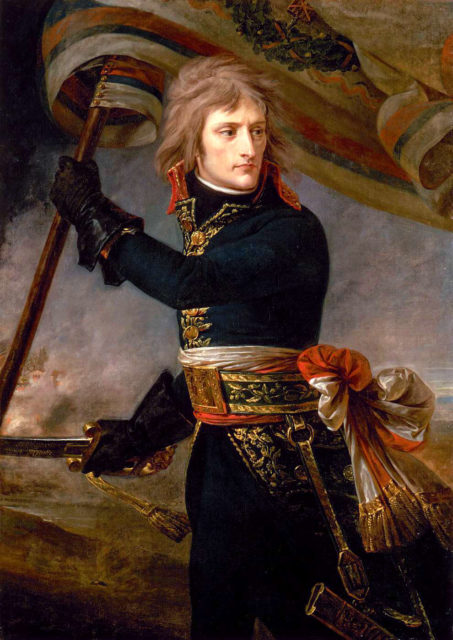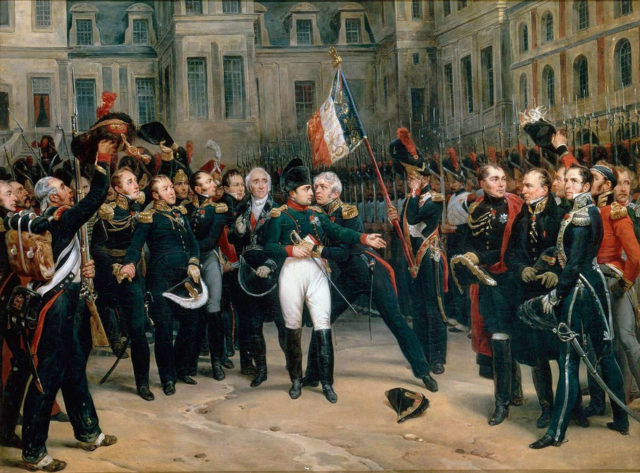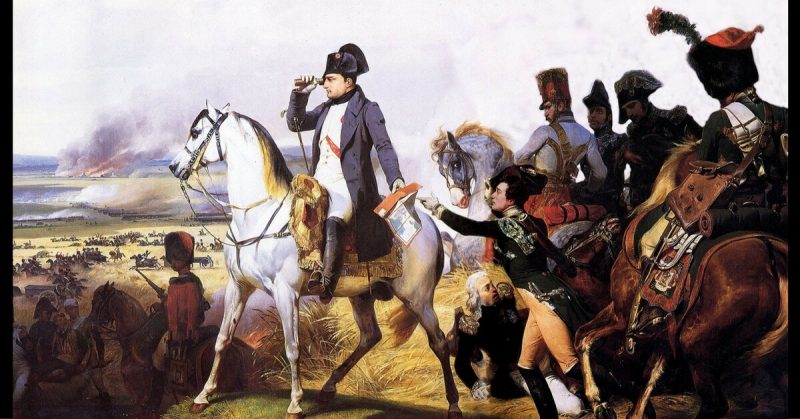Napoleon Bonaparte was a man of great talent. A skilled general, a cunning politician, and a charismatic leader of men. Another reason why his image is so firmly etched in history is that Napoleon was a great propagandist.
Dispatches from Italy
Napoleon’s first great propaganda effort was part of his military campaign in Italy in 1796-7.
Not yet one of France’s political leaders, Napoleon was a military commander on the rise. He was given the most responsible position of his career so far, and he wanted to make sure everyone knew what he had achieved. It was a perfect opportunity to build upon his ambitions.
It was not his only motive. He recognized the value the media had in reporting on the war itself. It could increase support among civilians, lift the morale of his soldiers, and damage the morale of the enemy.
Newspapers produced by and for the army had become a feature of French military life in the revolutionary period. Napoleon founded two in Italy – the Courrier de l’Armée d’Italie and La France Vue de l’Armée d’Italie. He had both of them circulated among his troops, but soldiers were not the only targets for these papers. Copies were sent back to Paris, where excerpts appeared in the mainstream press.
These newspapers were noteworthy for two things. One was the way in which they emphasized Napoleon’s achievements, talking about successes and ignoring defeats. The other was the delicate balance they struck. The Courrier appealed to the revolutionary elite while La France was more conservative in tone. Between them, they could please radicals while reassuring conservatives.
Beyond the Printed Word
As Paris was filled with tales of Napoleon’s exploits, it was not surprising artists were inspired by him. Poets began writing tributes to Napoleon. Playwrights put his adventures on stage. Sculptors made busts of his head. Painters depicted both the man and dramatic battles he had led.
From the start, Napoleon encouraged this. He recognized how powerfully the theater could move people and kept in touch with what was happening there. He began courting the attention of painters. Antoine-Jean Gros was a particular favorite who became Napoleon’s semi-official portraitist.
He produced the first portrait of Napoleon in 1797, as well as the famous image of Bonaparte on the Bridge of Arcole, celebrating one of the general’s successes. Both were turned into engravings that sold throughout France and beyond, spreading Napoleon’s image.

Once he became First Consul and then Emperor, Napoleon had the resources to commission the greatest artists of his day, men such as Jacques-Louis David, the man Gros had studied under. Napoleon’s coronation, his family, his battles, all would be immortalized in oils and shared in engravings. From the start, he used pictures as well as words.
Newspapers from Egypt
Napoleon’s greatest propaganda coup came from the campaign in Egypt. There, his propaganda reached ridiculous levels of audacity, making a failed military campaign look like a brilliant success. Due to his accounts from Egypt, he made himself look both exotic and scholarly.
Even before he set out for Egypt, Napoleon knew how the expedition would be reported. He recruited over 160 scholars in different fields of study to accompany him. While this was driven in part by his genuine interest in history and the east, it also served as a propaganda function. He was going to show himself as a man of the enlightenment, sending discoveries back home.
As in Italy, he produced two newspapers with different angles. The Courrier de l’Egypt was aimed at the troops and ordinary people back home. It talked about Egypt’s rich culture, French diplomatic successes, and Napoleon’s military triumphs. It countered rumors – often true – of his failures.
La Décade Egyptienne was more scholarly, focusing on the expedition’s intellectual discoveries. Both the low-brow and the high-brow Napoleon were reported on back home.The impact of these newspapers and Napoleon’s control of information cannot be overstated. He abandoned a failing campaign, left his army diseased, broken and isolated, yet returned home in triumph.
Control of the Press
During his rise to power, Napoleon made great use of the free press. The freedom to print what he wanted allowed him to shape his public image. With it, he warped French perceptions of reality.
Once he became Emperor, he turned against the free press. His was an authoritarian regime that asserted control over every significant aspect of society. A ruler who had unleashed the power of the media so decisively could hardly let it be used against him, any more than he would equip his opponents with cannons and warships.
The result was the establishment of the General Direction of the Book Trade. This body set out to monitor every aspect of publishing within the French Empire. Every printer, publisher, and bookseller would be overseen. Everything they published was subject to scrutiny.
A fan since his youth of Julius Caesar, Napoleon would not make that great ruler’s mistake and let the powers that raised him up stab him in the back.

Memoires
Perhaps believing too much in his own image of greatness, Napoleon over-stretched and his Empire fell. Having faced military and political defeat, he refused to be beaten in the propaganda war.
His brief return to glory in the Hundred Days of 1815 restored some of the shine to Napoleon’s tarnished reputation. Then from his exile in St Helena, he sought to build upon that.
In his island home, Napoleon talked at great length with the men who had accompanied him into exile. He spoke about his achievements and his failings, often blaming others for his defeats. In place of the shifting and pragmatic politics of his life, he wove an image of a man following a consistent vision, trying to create a stable, liberal nation.
After his death, these reflections would appear in several books by different men who had heard him talk. Their memoirs became Napoleon’s last great act of propaganda, adding to his glory from beyond the grave.
Source:
Alan Forrest (2011), Napoleon.
